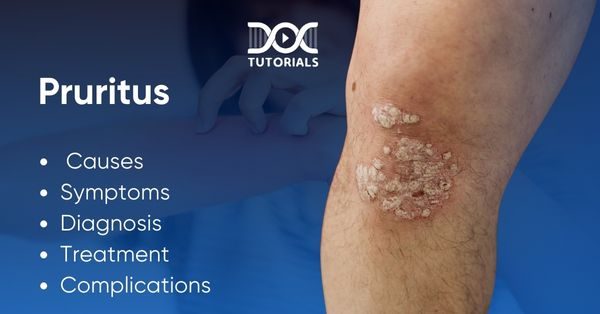Pruritus: Causes, Symptoms, Diagnosis, Treatment, and Complications

With a worldwide prevalence of 39.8%, Pruritus, or itching, is a common, widespread skin condition which occurs at any age, regardless of health status. While occasional itching is normal, persistent or severe, pruritus may indicate an underlying medical issue that requires attention. Skin disorders, allergies, systemic disease, and psychological or neurological factors could lead to this condition.
Effective management requires understanding the causes, symptoms, and treatment of pruritus. This comprehensive guide will help you learn more about pruritus, its triggers, how it is diagnosed, the best available treatments, and the frequently asked questions.
What is Pruritus?
Pruritus is a medical term for an itchy sensation on the skin that triggers an urge to scratch. Depending on the severity, it could be confined to a particular area or damage the entire body. The sensation is usually caused by conditions such as dry skin, allergies, or infections that stimulate nerve endings in the skin.
Skin disorders, systemic diseases, and allergic reactions are possible underlying causes of this condition. Depending on the cause of the itch, the skin may look unusual, inflamed, rough, or uneven. Repetitive scratching can make the areas larger and pruritic or uncomfortable enough to bleed or become infected.
Types of Pruritus
Pruritus can be categorised into 10 types based on its causes and the area it is affecting. Some of the most common types of pruritus are as follows:
1. Dermatologic Pruritus:
This is caused by skin diseases such as eczema, psoriasis or fungal infections.
2. Systemic Pruritus:
They are linked to internal diseases like kidney failure, liver disease or diabetes.
3. Neuropathic Pruritus:
This develops as a result of nerve damage or neurological disorders of multiple sclerosis or shingles.
4. Psychogenic Pruritus:
This one is triggered as a result of psychological disorders like anxiety or stress.
5. Aquagenic Pruritus:
It happens after contact with water, often without visible skin changes.
6. Brachioradial Pruritus:
Upper arm itching can be caused by nerve damage or sun exposure.
7. Nocturnal Pruritus:
The itching gets worse at night, which may be related to hormonal changes or irritants in the skin.
8. Pruritus Ani:
Infections, haemorrhoids or irritants can cause itching around the anal area.
9. Senile Pruritus:
Itching occurs in more than one spot in older people, which is often the result of dry skin or changes from ageing.
10. Uremic Pruritus:
Itching with Kidney disease, particularly in patients on dialysis.
Common Causes of Pruritus
There are many possible causes of pruritus, or itching of the skin, including:
- Skin Conditions: Eczema, psoriasis, dermatitis, and fungal infections.
- Allergic Reactions: Food allergies, insect bites, and medication side effects.
- Systemic Diseases: Liver, kidney failure, diabetes, and thyroid disorders.
- Neurological Conditions: Multiple sclerosis, nerve damage, or shingles.
- Psychological Factors: Stress, anxiety, and depression.
- Dry Skin (Xerosis): Common in elderly individuals and during cold weather.
- Infections: Fungal infections, scabies or chickenpox.
- Pregnancy: The itching results from hormonal changes.
- Medications: Side effects of some drugs (opioids, aspirin, anti-malarial drugs, blood pressure drugs) include itching.
- Underlying Diseases: HIV/AIDS, anaemia, and cancers (including lymphomas, leukaemia, and skin cancer).
Risk Factors of Pruritis
Factors that raise the risk of pruritus (itchy skin) include:
- Age: Pruritus is more likely in older adults, by virtue of dry skin and changes in the ageing skin.
- Chronic Conditions: The risk increases if you have diabetes, kidney disease, liver disease, thyroid disorder or anaemia.
- Skin Disorders: The more common culprits are conditions like eczema, psoriasis or dermatitis.
- Allergies: It could also be related to seasonal allergies, hay fever or asthma.
- Pregnancy: Itching is caused by hormonal changes during pregnancy.
- Cancer: Pruritus is associated with some cancers, such as leukaemia and lymphoma.
- Medications: Pruritus is triggered by some antibiotics, opioids, and antifungals.
- Environmental Factors: Exposure to harsh soaps, chemicals, or extreme weather conditions.
Symptoms of Pruritus
The main sign of pruritus is the intense itching sensation it produces, but the underlying cause may be accompanied by other signs as well.
- Redness or Rash: Rashes or inflamed skin may be visible.
- Dry or Cracked Skin: Common in cases of xerosis (dry skin).
- Bumps or Blisters: Allergic reactions or infections may cause these to develop.
- Scaling or Flaking: Usually found in these conditions like eczema or psoriasis.
- Thickened Skin: Scratching can also result in lichenification (thick or leathery skin).
- Discolouration: When skin itching is prolonged, it may change the skin pigmentation.
Itching may also occur without the visible signs of skin damage, especially if the cause is internal or a systemic disease.
Diagnosis of Pruritus
The diagnosis of pruritus will depend on your medical history, physical examination, and occasionally on further tests to find the underlying cause. Here’s an overview:
- Medical History
The doctor may ask about:
- Duration and severity of itching.
- Any exposure to new allergens, irritants or new medications.
- Family history of skin or systemic conditions.
- Physical Examination
- Preparation of a thorough skin cheque for primary or secondary lesions.
- Area studies such as scalp, nails, and anogenital region.
- Laboratory Tests
- Blood Tests: To determine whether there are problems with kidney or liver anaemia, thyroid issues, or diabetes.
- Allergy Tests: To identify potential allergens.
- Skin Biopsy: If there is suspicion of a skin condition.
- Imaging or Specialized Tests
- Swollen lymph nodes can be related to itchy skin, and in some cases, a chest X-ray and more sophisticated exams may be needed.
Treatment Options for Pruritis
The treatment for pruritus (itchy skin) depends upon its cause. Here are some common approaches:
1. Topical Treatments
- Moisturisers: Prevent dryness and soothe itching.
- Corticosteroid Creams: Reduce inflammation and allergic reactions.
- Calamine Lotion: Provides relief for mild pruritus.
2. Medications
- Antihistamines: Block allergic reactions causing pruritus.
- Anti-inflammatory Drugs: Used for autoimmune-related itching.
- Antidepressants (SSRIs): They help in treating chronic pruritus associated with anxiety or depression.
3. Home Remedies & Lifestyle Changes
- Cold Compress: Reduces irritation and swelling.
- Oatmeal Baths: Relieves itching and soothes skin.
- Avoid Harsh Soaps & Detergents: Use mild, fragrance-free products.
- Comfortable Clothing: Dress in loose, breathable clothing (preferably cotton clothes).
- Wear Sunscreen: It protects your skin from the harmful effects of UV (ultraviolet) rays from the sun and prevents the development of sunburn.
4. Advanced Pruritus Treatments
- Phototherapy: UV light therapy for severe or chronic pruritus.
- Biologic Therapies: It is used for diseases such as eczema and psoriasis.
Complications of Pruritis
If pruritus is left untreated or poorly managed, it can progress to several complications, such as:
- Skin Damage: Persistent scratching can thicken the skin (lichenification), crack, or open wounds.
- Infections: Scratching the skin can lead to breakage of the skin and make it prone to bacterial infections such as impetigo.
- Scarring: Repeated scratching may lead to permanent scars.
- Sleep Disturbances: Chronic itch, especially at night, can cause fatigue and negatively affect sleep patterns.
- Psychological Impact: Pruritus can become long-term and cause stress, anxiety, or depression, which often affects the quality of life.
FAQs about Pruritus
1. What are the leading causes of pruritus?
Skin conditions, allergic reactions, systemic diseases, neurological disorders, and environmental factors like dry weather may cause pruritus.
2. Can pruritus be a symptom of an underlying disease?
Yes, chronic pruritus can be a sign of systemic diseases such as liver disease, kidney failure or diabetes.
3. What is the best pruritus treatment for dry skin?
Moisturisers, not taking hot showers, and applying hydration lotions help reduce itchiness due to dry skin.
4. When should I see a doctor for pruritus?
If pruritus continues for more than two weeks or is severe, or if there is accompanying fever, weight loss, or yellowing of the skin, consult a doctor.
5. Can stress cause pruritus?
Yes, stress and anxiety can make pruritus worse and cause excessive scratching that damages the skin.
6. What foods can worsen pruritus?
In some people, pruritus is worsened by spicy foods, alcohol, and processed sugars in addition to specific allergens such as dairy or nuts.
7. Is pruritus contagious?
Pruritus is not contagious, though some underlying causes, such as scabies, fungal infections, or allergies, can spread through direct contact.
8. Can pruritus be prevented?
Yes, skin hydration, allergy avoidance, stress management, and treating underlying conditions can certainly improve the prevention of pruritus.
Conclusion
Pruritus can significantly impact daily life, but understanding its causes, symptoms, and treatments can help manage and prevent itching. Mastering dermatological conditions like pruritus is crucial for medical students preparing for NEET PG 2025. Stay ahead in your medical exams with expert content from DocTutorials!
Latest Blogs
-

NEET PG Exam 2025- Date, Pattern, Marking Scheme, Subject Wise Weightage, and Exam Mode
NEET PG Exam 2025 is the ultimate gateway for medical graduates aspiring to pursue postgraduate courses in medicine, including MD,…
-

INI CET Exam 2025: Your Roadmap to Success – Key Topics, Strategies, and Lessons from Last Year’s Papers
The INI CET exam is more than just a test; it’s a significant milestone for many medical students aiming to…
-

INI CET Exam Success: Previous Year Question Papers & Ultimate Guide – INI CET PYQ
One can feel overwhelmed while preparing for the INI CET (Institute of National Importance Combined Entrance Test). A vast syllabus,…




